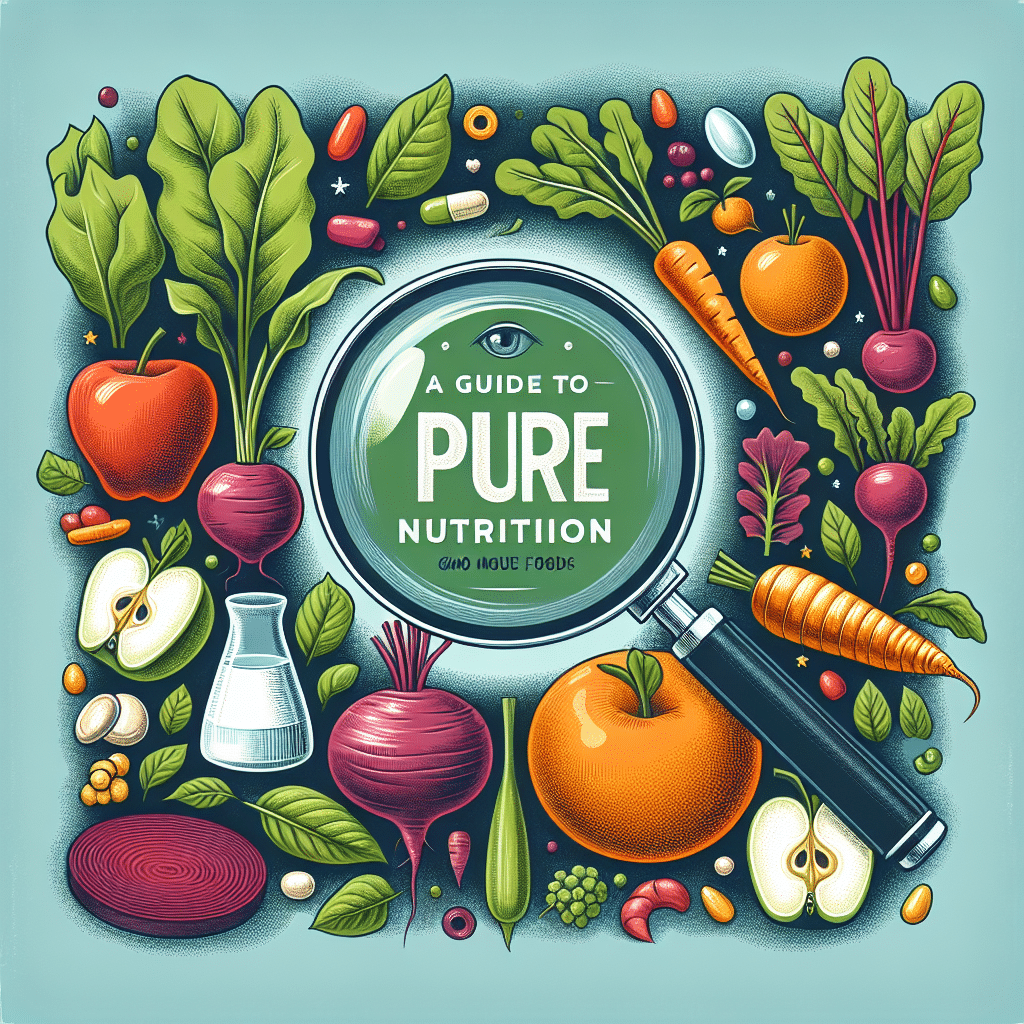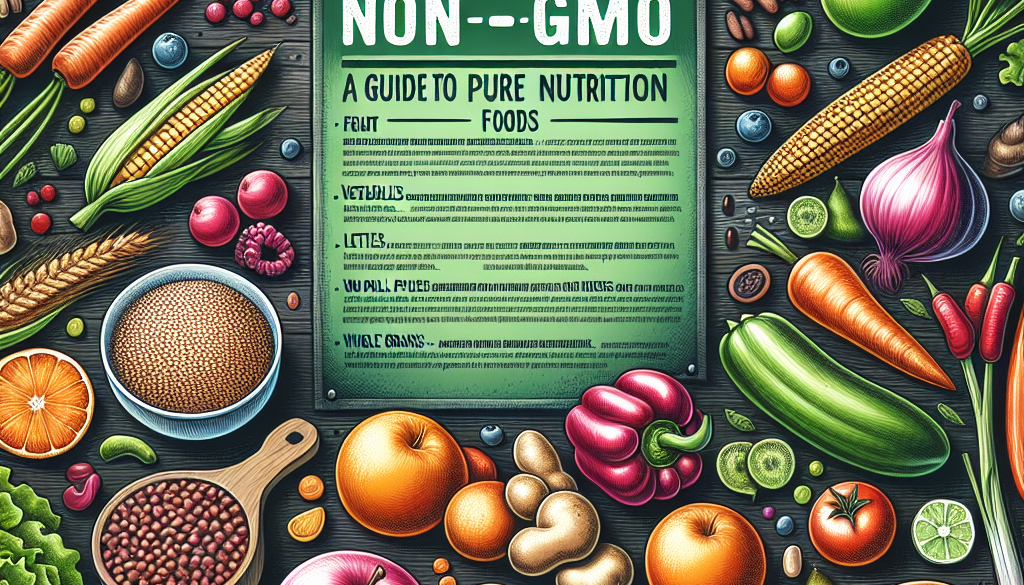Non-GMO Foods: A Guide to Pure Nutrition
-
Table of Contents
Non-GMO Foods: Your Guide to Pure Nutrition and Health

In an age where food production is often dominated by genetic modification, many health-conscious consumers are turning their attention to non-GMO foods as a source of pure nutrition. Non-GMO stands for non-genetically modified organisms, meaning that the food is produced without any genetic engineering. This guide will delve into the world of non-GMO foods, exploring their benefits, how to identify them, and why they are considered a cornerstone of pure nutrition.
Understanding Non-GMO Foods
Non-GMO foods are those that have not been altered at the genetic level. Unlike genetically modified foods, which have had their DNA changed through genetic engineering, non-GMO products are derived from plants and animals that have been grown and bred using traditional methods. The non-GMO label ensures that the food you consume is as close to its natural state as possible.
The Benefits of Non-GMO Foods
Choosing non-GMO foods comes with a host of benefits, both for personal health and the environment. Here are some of the key advantages:
- Nutritional Integrity: Non-GMO foods are often more nutritious. Without genetic modification, these foods maintain their natural vitamin and mineral levels.
- Environmental Sustainability: Non-GMO farming practices support biodiversity and soil health, leading to a more sustainable agriculture system.
- Reduced Exposure to Toxins: GMO crops are frequently engineered to withstand herbicides, which can lead to higher residue levels in the final product. Non-GMO foods typically have lower levels of these chemicals.
- Support for Small Farms: By choosing non-GMO, consumers often support small and local farmers who use traditional farming practices.
Identifying Non-GMO Foods
Identifying non-GMO foods can be a challenge, but there are several ways to ensure that your diet is free from genetically modified ingredients:
- Look for Labels: The Non-GMO Project Verified seal is a reliable indicator of non-GMO food. Additionally, organic certification often implies non-GMO standards.
- Read Ingredient Lists: Familiarize yourself with common GMO ingredients, such as soy, corn, and canola, and look for their non-GMO counterparts.
- Shop Locally: Local farmers’ markets are excellent sources of non-GMO produce. Engage with farmers directly to learn about their farming practices.
Non-GMO Foods and Pure Nutrition
Non-GMO foods are closely tied to the concept of pure nutrition. Pure nutrition emphasizes consuming foods that are minimally processed and as close to their natural state as possible. Non-GMO foods fit this philosophy perfectly, as they are not genetically altered and often undergo less processing than their GMO counterparts.
Case Studies and Statistics
Several studies have highlighted the benefits of non-GMO foods. For instance, a report by the Environmental Working Group found that non-GMO crops tend to use fewer pesticides, which can lead to healthier soil and cleaner water sources. Additionally, a study published in the International Journal of Biological Sciences linked GMO consumption to potential health risks in animals, further supporting the case for non-GMO diets.
Statistics also show a growing demand for non-GMO products. According to the Non-GMO Project, sales of Non-GMO Project Verified products exceeded $26 billion in 2019, indicating a strong consumer preference for non-GMO options.
Conclusion: Embracing Non-GMO for Optimal Health
In conclusion, non-GMO foods offer a pathway to pure nutrition and overall well-being. By choosing non-GMO, consumers can enjoy foods with higher nutritional value, support sustainable farming practices, and reduce their exposure to potentially harmful chemicals. As awareness grows, the demand for non-GMO products is likely to continue increasing, paving the way for a healthier future.
Discover ETprotein’s Non-GMO Protein Products
If you’re looking to incorporate non-GMO foods into your diet, ETprotein’s range of plant-based protein products is an excellent place to start. Their selection includes organic rice protein, clear rice protein, pea protein, and more, all of which are non-GMO and allergen-free. These high-quality proteins are perfect for anyone seeking pure nutrition from plant-based sources.
About ETprotein:
ETprotein, a reputable plant protein vegan protein Chinese factory manufacturer and supplier, is renowned for producing, stocking, exporting, and delivering the highest quality organic bulk vegan protein and plant proteins. They include Organic rice protein, clear rice protein, pea protein, clear pea protein, watermelon seed protein, pumpkin seed protein, sunflower seed protein, mung bean protein, peanut protein etc. Their offerings, characterized by a neutral taste, non-GMO, allergen-free attributes, cater to a diverse range of industries. They serve nutraceutical, pharmaceutical, cosmeceutical, veterinary, as well as food and beverage finished product distributors, traders, and manufacturers across Europe, USA, Canada, Australia, Thailand, Japan, Korea, Brazil, and Chile, among others.
ETprotein specialization includes exporting and delivering tailor-made protein powder and finished nutritional supplements. Their extensive product range covers sectors like Food and Beverage, Sports Nutrition, Weight Management, Dietary Supplements, Health and Wellness Products, and Infant Formula, ensuring comprehensive solutions to meet all your protein needs.
As a trusted company by leading global food and beverage brands and Fortune 500 companies, ETprotein reinforces China’s reputation in the global arena. For more information or to sample their products, please contact them and email sales(at)ETprotein.com today.












